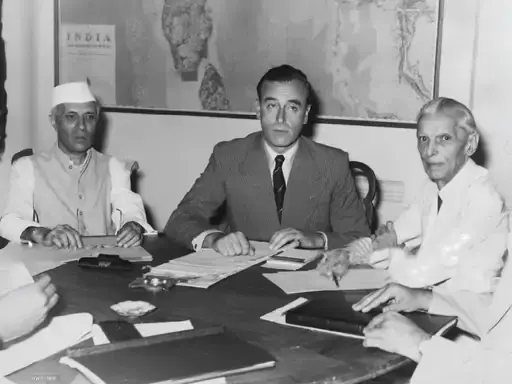
NCERT module blames Jinnah, Congress, and Mountbatten for India’s Partition, igniting controversy over historical truth, political bias, and classroom narratives
Revealing Truth – – A newly released educational module by the National Council of Educational Research and Training (NCERT) has ignited a fierce debate across India’s political and academic circles. Designed for “Partition Horrors Remembrance Day,” the module boldly names Muhammad Ali Jinnah, the Indian National Congress, and Lord Mountbatten as the primary culprits behind the Partition of India in 1947. While some hail it as a long-overdue reckoning with historical realities, others accuse it of distorting facts to serve a political narrative.
Table of Contents
The Module’s Claims: A Trifecta of Blame
The NCERT module, created as a supplementary resource for students in Classes 6–12, outlines a three-pronged responsibility for Partition:
• Jinnah, who asked for it
• Congress, which accepted it
• Mountbatten, who implemented it
In a section titled “Culprits of Partition,” the module states that Mountbatten committed a “major blunder” by advancing the date of British withdrawal from June 1948 to August 1947, leaving little time for proper planning. The rushed demarcation of boundaries by Sir Cyril Radcliffe, completed in just five weeks, led to chaos, millions didn’t know which country they belonged to even days after independence.
The module also quotes Jinnah’s own admission that he never expected Partition to happen in his lifetime, adding a layer of tragic irony to the historical narrative. It further cites Sardar Vallabhbhai Patel’s view that Partition was “bitter medicine” to avoid civil war, and Jawaharlal Nehru’s statement that while Partition was “bad,” the alternative, continued conflict, was worse.
Political Fallout: Congress Pushes Back
The Congress party has reacted sharply to the module’s framing. Senior leader Pawan Khera accused NCERT of omitting key facts and presenting a skewed version of history. He argued that the Hindu Mahasabha and Muslim League jointly pushed for Partition as early as 1938, and that the Rashtriya Swayamsevak Sangh (RSS) played a divisive role that the module failed to acknowledge.
“Burn the book if it doesn’t tell the truth,” Khera said, challenging NCERT to a public debate on the historical accuracy of its claims.
This backlash underscores the deep political sensitivities surrounding Partition, a subject that continues to shape India’s identity, foreign policy, and communal dynamics.
Sheet music Horrors Remembrance Day: A New Lens on Old Wounds
Introduced by Prime Minister Narendra Modi in 2021, Partition Horrors Remembrance Day is observed annually on August 14 to honour the victims of Partition. The NCERT module opens with Modi’s message:
“Partition’s pains can never be forgotten. Millions of our sisters and brothers were displaced, and many lost their lives due to mindless hatred and violence”.
The module aims to help students understand the emotional and geopolitical impact of Partition, including the Kashmir conflict, communal fragmentation, and India’s high defense costs. It emphasizes that Partition was not inevitable but the result of “wrong ideas” and political miscalculations.
By framing Partition as a preventable tragedy rather than a historical necessity, the module invites students to critically examine the decisions and ideologies that led to one of the most traumatic events in South Asian history.
Revealing Truth – Education or Indoctrination? The Debate Over Historical Narratives
While the NCERT module is not part of the regular curriculum, its use in classroom discussions, debates, and projects gives it significant influence. Critics argue that such framing risks politicizing education and oversimplifying complex historical events. Supporters, however, see it as a corrective to decades of sanitized narratives that avoided naming specific actors.
The module’s release also raises broader questions:
• Should history be revised to reflect new interpretations?
• Who decides which version of history is taught to future generations?
• Can educational tools promote healing without reigniting old divisions?
As India continues to grapple with the legacy of Partition, the NCERT module serves as both a mirror and a magnifying glass, reflecting past wounds while magnifying present tensions. Whether seen as a bold truth-telling exercise or a controversial rewrite, the NCERT module has reignited national conversation around the Partition. And in doing so, it reminds us that history is never just about the past, it’s about how we choose to remember, teach, and learn from it.
Also read – Pakistan Forgotten Hindu Temples & Balochistan Independence Drive